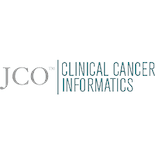
JCO Clinical Cancer Informatics
Scope & Guideline
Driving breakthroughs in oncology through health informatics.
Introduction
Aims and Scopes
- Natural Language Processing (NLP) Applications:
A significant portion of the journal's articles explores the use of NLP to extract clinical information from unstructured data sources, facilitating the analysis of patient records and enhancing decision-making in oncology. - Machine Learning and Artificial Intelligence in Oncology:
Research frequently employs machine learning and AI techniques to predict patient outcomes, optimize treatment protocols, and develop personalized care strategies, highlighting the journal's commitment to cutting-edge technology. - Real-World Data Utilization:
The journal emphasizes the importance of real-world data in understanding treatment effectiveness, patient experiences, and health disparities, showcasing studies that leverage electronic health records and other data sources. - Patient-Centered Outcomes and Experiences:
A core focus is on understanding and improving patient-centered outcomes through the analysis of patient-reported outcomes, patient experiences, and engagement in their care processes. - Innovations in Clinical Decision Support Systems:
The journal explores developments in clinical decision support tools that utilize informatics to assist healthcare providers in making evidence-based decisions for cancer treatment.
Trending and Emerging
- Integration of Digital Health Tools:
There is a growing interest in the development and evaluation of digital health tools, such as mobile applications and telehealth platforms, which aim to enhance patient engagement and remote monitoring. - Advanced Predictive Analytics:
The trend towards using advanced predictive analytics, including AI and machine learning, is gaining momentum as researchers seek to improve prognostic models and treatment recommendations. - Health Disparities and Equity in Cancer Care:
An increasing number of studies focus on health disparities and the impact of social determinants on cancer outcomes, emphasizing the need for equitable approaches in research and clinical practice. - Patient-Reported Outcomes Integration:
The integration of patient-reported outcomes into clinical decision-making is becoming more prevalent, highlighting the importance of patient experiences and preferences in treatment plans. - Interoperability and Data Sharing:
Emerging themes include the need for improved interoperability between systems and data-sharing initiatives that enhance collaborative research and clinical care across institutions.
Declining or Waning
- Traditional Statistical Methods:
The reliance on conventional statistical methods for data analysis is decreasing as more researchers adopt machine learning and AI approaches, which offer enhanced predictive power and insights. - Basic Laboratory Research:
There is a noted decline in publications centered around basic laboratory research, as the journal increasingly focuses on applied informatics and technology-driven studies that directly impact clinical practice. - General Health Policy Discussions:
While health policy remains important, the focus on broad policy discussions without specific applications to informatics or technology in oncology has waned, giving way to more specialized research.
Similar Journals
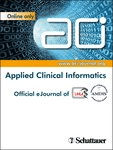
Applied Clinical Informatics
Transforming healthcare through innovative informatics.Applied Clinical Informatics is a leading journal dedicated to the expanding field of health informatics and its applications within clinical settings. Published by GEORG THIEME VERLAG KG in Germany, this journal serves as a pivotal platform for researchers and professionals engaged in the integration of technology and healthcare, aiming to improve patient outcomes through innovative informatics solutions. With a solid Q2 ranking in multiple disciplines including Computer Science Applications, Health Informatics, and Health Information Management, it reflects its prominent position in the academic landscape. The journal provides accessible content while fostering dialogue on key issues and advancements in clinical informatics. Covering a wide array of topics from data management to e-health applications, Applied Clinical Informatics is essential reading for those looking to stay attuned to the latest research and developments from 2009 to 2024, enriching the knowledge base of students, professionals, and researchers worldwide.
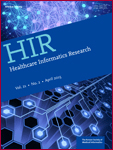
Healthcare Informatics Research
Pioneering the future of health informatics research.Healthcare Informatics Research, published by the Korean Society of Medical Informatics, is a leading open access journal that has been advancing the field of healthcare informatics since its inception in 2010. With an ISSN of 2093-3681 and E-ISSN of 2093-369X, the journal provides a vital platform for disseminating high-quality research aimed at improving healthcare systems through innovative informatics solutions. Recognized for its contributions, it holds a Q2 rank in Biomedical Engineering and Q3 rankings in both Health Informatics and Health Information Management for 2023, reflecting its stature within the academic community. The journal is committed to open access, ensuring that research is freely accessible to researchers, professionals, and students worldwide, thus promoting knowledge sharing and collaboration. Located in the dynamic city of Seoul, South Korea, the journal serves as a hub for groundbreaking studies that impact health systems globally, making it an essential resource for those at the forefront of healthcare technology and management.
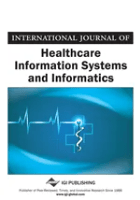
International Journal of Healthcare Information Systems and Informatics
Pioneering solutions for a data-driven healthcare landscape.International Journal of Healthcare Information Systems and Informatics is a prestigious academic journal published by IGI Global, focusing on the vital intersection of healthcare and information technology. With an ISSN of 1555-3396 and E-ISSN of 1555-340X, this journal serves as a pivotal platform for researchers, professionals, and students to explore innovative solutions and advancements in healthcare informatics. As of 2023, it holds a commendable Q3 ranking in categories such as Information Systems and Medicine, highlighting its significant contribution to the academic community. Covering a wide range of topics from healthcare data management to the implementation of information systems in clinical settings, the journal aims to foster critical discussions and disseminate impactful research. With a publication history spanning from 2006 to 2024, it continues to play a crucial role in guiding the future of healthcare information systems. Readers can access this journal through traditional subscription methods, ensuring that leading-edge research reaches those most invested in the evolution of healthcare informatics.

JMIR Medical Informatics
Connecting Researchers and Practitioners in Health InformaticsJMIR Medical Informatics is a leading open access journal dedicated to the field of medical informatics, published by JMIR Publications, Inc. since 2013 in Canada. With an impressive impact factor and a distinguished Q2 ranking in both Health Informatics and Health Information Management categories, this journal plays a pivotal role in disseminating cutting-edge research and innovative practices. Covering a wide scope that includes clinical informatics, health information systems, and data analytics, JMIR Medical Informatics provides valuable insights for researchers, practitioners, and policymakers alike. The journal is accessible to a global audience, ensuring that pioneering studies and methodologies reach those who can apply them to enhance health outcomes. With its commitment to advancing the body of knowledge in medical informatics, this journal stands as a vital resource for anyone involved in or studying the intersection of healthcare and technology.

INFORMATION RESEARCH-AN INTERNATIONAL ELECTRONIC JOURNAL
Exploring Innovative Research in Information Studies.INFORMATION RESEARCH - AN INTERNATIONAL ELECTRONIC JOURNAL is a distinguished open-access journal published by the University of Sheffield's Department of Information Studies, situated in England. Since its inception in 1995, the journal has been at the forefront of disseminating research findings in the field of Library and Information Sciences, earning a commendable Q2 ranking in the category for 2023. With an ISSN of 1368-1613 and an E-ISSN of 1368-1613, it serves as a vital resource for scholars, practitioners, and students alike, providing a platform for innovative insights and engaging discussions. The journal accepts submissions from diverse perspectives related to the information research domain and contributes to the ongoing dialogue among academic professionals worldwide. With a Scopus ranking placing it at 150 out of 280 in its field, this publication underscores its importance in shaping the future of information studies while enabling wide accessibility to cutting-edge research.
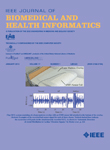
IEEE Journal of Biomedical and Health Informatics
Transforming Health Through Innovative InformaticsIEEE Journal of Biomedical and Health Informatics is a premier publication dedicated to advancing the field of biomedical and health informatics. Published by the esteemed IEEE-Inst Electrical Electronics Engineers Inc, this journal boasts a notable impact within various disciplines, ranking in the top quartile (Q1) across key categories such as Biotechnology, Computer Science Applications, Electrical and Electronic Engineering, Health Informatics, and Health Information Management as of 2023. With a strong Scopus ranking—placing it at #11 in Health Informatics and #6 in Health Information Management—it serves as a vital resource for cutting-edge research and innovative practices. Open Access options enhance accessibility, fostering collaboration among researchers, professionals, and students. Since its inception in 2013, the journal has been committed to publishing high-quality, peer-reviewed articles that explore the pivotal intersection between technology and healthcare, thereby contributing significantly to the evolution of medical practices and patient care.

Intelligent Medicine
Empowering global collaboration in health informatics.Intelligent Medicine, published by Elsevier, is a leading open-access journal dedicated to advancing the fields of Artificial Intelligence, Biomedical Engineering, Health Informatics, and related areas within Medicine. Since its inception in 2021, it has quickly established itself among the top tier of academic publications, holding a commendable Q2 ranking in several categories, including a rank of #51 in Health Informatics and #104 in Medicine (Miscellaneous) as of 2023. The journal aims to disseminate innovative research that harnesses AI technologies to improve healthcare outcomes, bridging the gap between cutting-edge technology and medical practice. With its open-access model, Intelligent Medicine ensures broad dissemination of research findings, facilitating collaboration and knowledge sharing among researchers, practitioners, and students globally. Located in Amsterdam, Netherlands, this journal plays a pivotal role in shaping the future of intelligent healthcare solutions, inviting submissions that push the boundaries of conventional medicine through creative and impactful research.

BMC Medical Informatics and Decision Making
Exploring the intersection of technology and healthcare.BMC Medical Informatics and Decision Making is a leading journal in the fields of medical informatics and health policy, published by BMC since its inception in 2001. With an impressive impact factor reflecting its status as a Q1 journal in both Computer Science Applications and Health Informatics, it serves as a vital resource for researchers, professionals, and students dedicated to advancing healthcare through informatics. The journal is committed to disseminating high-quality, peer-reviewed research focused on the innovative use of information technology in healthcare, decision-making processes, and policy formulation. As an Open Access platform, it ensures that findings are widely accessible and can foster collaboration across various disciplines. Positioned at the cutting edge of health informatics, BMC Medical Informatics and Decision Making aims to influence practice and inspire new research directions, making it an essential publication for anyone involved in improving health systems worldwide.

ONCOLOGIST
Transforming insights into impactful cancer therapies.ONCOLOGIST is a premier, open-access journal published by Oxford University Press, advancing the field of cancer research since its inception in 1996. With an impressive H-Index and a prestigious placement within the Q1 category in Cancer Research, Medicine, and Oncology for 2023, ONCOLOGIST stands at the forefront of oncological science, boasting a Scopus rank of #55 out of 404 in Medicine and #47 out of 230 in Cancer Research. This journal not only disseminates cutting-edge research but also aims to foster multidisciplinary approaches that are critical for addressing the complex challenges faced in cancer therapy and survivorship. Be part of a vibrant community as you explore impactful research articles that contribute to the global conversation on cancer. ONCOLOGIST is dedicated to providing an accessible platform for authors and readers alike, ensuring that high-quality research is available to all stakeholders in the fight against cancer.

BULLETIN DU CANCER
Connecting research and practice to improve patient outcomes.BULLETIN DU CANCER is a pivotal academic journal dedicated to the field of oncology, providing a platform for innovative research and insights into cancer treatment and diagnostics. Published by Elsevier Masson, Corp Off in France, this journal has been a part of the scientific community since 1966, and is committed to sharing critical findings that influence clinical practices and improve patient outcomes. Despite its recent rankings placing it in the Q4 category for Cancer Research and Q3 for Hematology and other related fields, BULLETIN DU CANCER remains essential for those interested in the latest developments in cancer biology and treatment methodologies. With an emphasis on both basic and clinical research, it serves as a valuable resource for researchers, healthcare professionals, and students seeking to deepen their understanding in various dimensions of oncology. This journal is particularly relevant as it continues to spotlight emerging research trends and supports the global imperative to combat cancer more effectively.